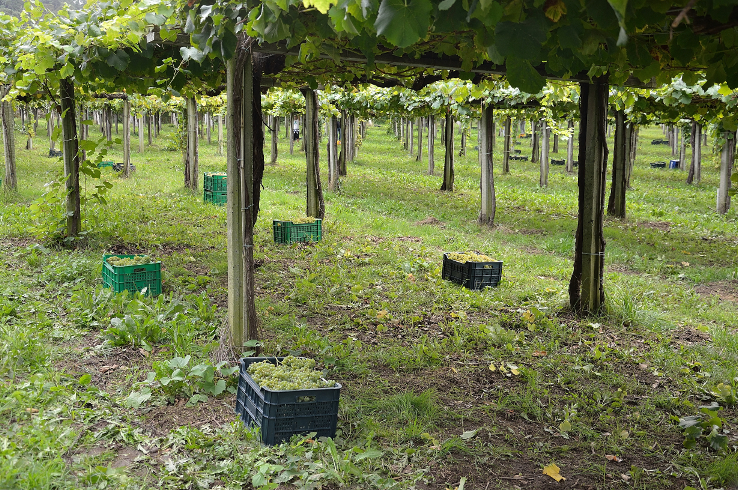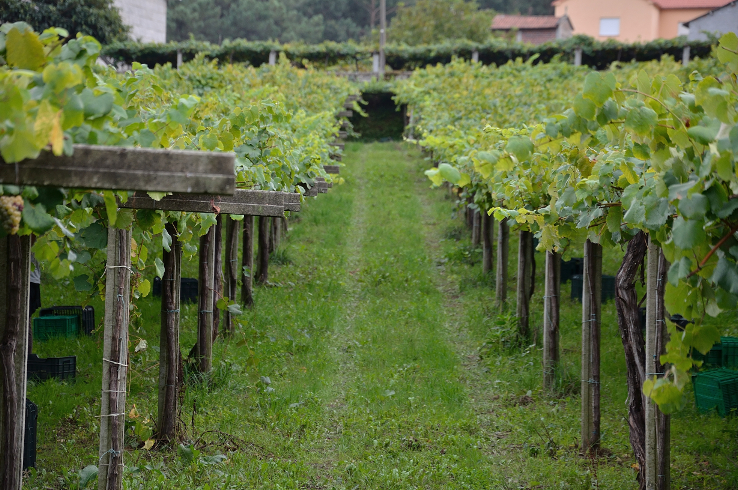2020 Viña Cartin Rías Baixas Albariño
Quintessential is the only word I can use to describe this wine. It comes from the ancestral home of Albariño, located directly on Spain’s Atlantic coast. It’s bright and refreshing… a solid weeknight staple.
Sustainable farming practices and hand-harvested.
- Tasting Notes Meyer lemon, clementine, citrus pith, honeydew, white grapefruit, marcona almond, sea salt
- Variety Albariño
- Region Spain, Rias Baixas
- Volume 750ml
- Alcohol Volume 13%
- Table Talk This wine comes from Val do Salnés, which many call the birthplace of Albariño.
Viña Cartín was founded in 1977 in Spain’s Salnés Valley, the oldest of Rias Baixas’ five subregions. In 2003, Viña Cartín moved their operations to a new location—an old winery in the heart of the area—and refurbished its interior with modern technology, yet maintained the estate’s artisanal character.
Contrary to the many regional wineries who purchase fruit, Viña Cartin proudly owns and sustainably farms 50 acres of their own vines. This direct access to the source allows them to control the raw material from start to finish. The estate’s vines average 30 years in age and benefit from the influence of the nearby Atlantic ocean. The resulting wines are bright, balanced, and laden with natural acidity.
ALBARINO
A pleasantly refreshing light white wine. Most known from Rias Baixas in Spain, but additionally as Vinho Verde in Portugal. Albariño’s are generally high in acid with refreshing citrus fruit flavors and a notably saline mineral character due to the regions’ proximity to the ocean. Serve these wines well-chilled while eating fish tacos on a hot summer day, you won’t be disappointed.
GALICIA, SPAIN
Part of what can be referred to as “Green” Spain, Galicia is located in the upper north west corner of the country. Wine production here dates back to the time of the Romans. It is one of the coolest areas producing refreshingly crisp Albariño with strong mineral characteristics as well as elegant red wine from the Mencía grape. Galicia boasts five denominated wine regions (DOs) including the infamous Rías Baixas, the closest DO to the Atlantic ocean.
Related Items
-
2023 Gilgal Golan Heights Winery Sauvignon Blanc
$30.00Gilgal Sauvignon Blanc is sourced from northern Golan Heights, Israel’s coolest winegrowing area with a strong reputation for quality Sauvignon Blanc that reflects the exceptional Mediterranean climate and growing conditions of the Galilee.
This crisp, medium-bodied wine exhibits pleasing fruit notes of guava and kiwi, along with lovely characters of lemon zest, mineral and citrus blossom. Ready to enjoy upon release, this Sauvignon Blanc is easygoing, an approachable white that is sure to please everyone.
Pair with bright flavors such as steamed fish with lime and coconut, skillet-roasted chicken breast with lemon, or fried artichokes with a sprinkling of sea salt.
Sustainable farming practices. Kosher Certified + Kosher for Passover.
-
2023 Domaine Garnier et Fils Chablis AOC
$36.00Chablis is a staple at Argaux. So when we decide to add a new one to the book, you better believe we have done our homework. This particular bottle was chosen after it won a blind tasting against 17 different bottles of Chablis. We invited our top Chablis clients to join us for the battle and this wine was voted #1. Enough said. It is a must-try.
Organic farming practices, native yeast fermentation, aged on the lees in stainless steel tanks for 11 months and filtered before bottling (no fining).
-
2019 i Clivi Friuli Colli Orientali DOC ‘Galea’ Friulano
$50.00This wine is a classic, ‘old school’ Friulano. It is earthy, deep, and strongly expressive of the Galea vineyard terroir from which it comes. Packed with sunshine, herbal flavors, nutty and
citrus notes, and a nice long mineral-driven finish.We love this wine for summer because of its brightness and freshness, yet uniquely complex and delicious character. Pair this beauty with your outdoor aperitivo, seafood, pastas, risottos, and light meats.
Certified Organic, 70 year old vines, hand-harvested, 24 mo. aging on the lees
-
2023 Fattoria Corzano e Paterno ‘Terre di Corzano’ Chianti DOCG
$30.00When it comes to Italian reds for summer, we want something smooth, easy-drinking, moderate in alcohol and not overly grippy—and this wine delivers. It’s bright and savory with just the right amount of structure to stand up to pasta al ragù or grilled lamb, yet refined enough to sip on its own.
Organic farming practices, hand-harvested, native yeast fermentation and less than 2,666 cases produced annually.










